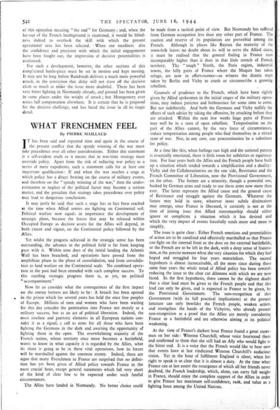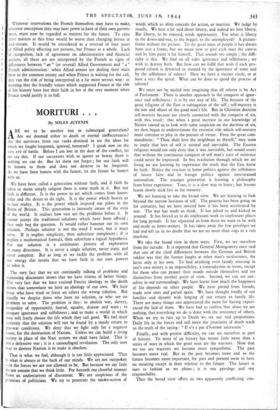WHAT FRENCHMEN FEEL
By PIERRE MAILLAUD
IT has been said and repeated time and again in the course of the present conflict that the speedy winning of the war must take precedence over all other considerations. Either this statement is a self-evident truth or it means that in war-time strategy must override policy. Apart from the risk of reducing war policy to a series of mere expedients, such a statement calls for at least one important qualification : If and when the war reaches a stage at
which policy has a direct bearing on the course of military events, and therefore on the " speedy winning of the war," then the under- estimation or neglect of the political factor may become a serious matter, and the postulate that strategy takes precedence over policy may lead to dangerous conclusions.
It may justly be said that such a stage has m fact been reached at the time when Allied armies are fighting on Continental soil. Political warfare now equals in importance the development of strategic plans, because the forces that may be released within Occupied Europe as decisive assets for the Allies will depend, in both extent and vigour, on the Continental policy followed by the Allies.
Yet whilst the progress achieved in the strategic sense has been outstanding, the advance in the political field is far from keeping pace with it. Within nine days of the initial landing the Atlantic Wall has been breached, and operations have passed from the amphibian phase to the phase of consolidation, and from consolida- tion to land warfare on the Continental scale. No combined opera- tion in the past had been attended with such complete success. To this startling strategic progress there is, as yet, - no political " accompaniment."
Now let us consider what the consequences of the first impact on the enemy fortress are likely to be: A breach has been opened
• in the prison which for several years has held the once free peoples
of Europe. Millions of men and women who have been waiting for this day consider the penetration into France not merely as a military success, but as an act of political liberation. Indeed, the most resolute and patriotic elements in all European nations con- sider it as a signal, a call to arms for all those who have been fighting the Germans in the -dark and awaiting the opportunity of fighting them in the open. The overwhelming majority of the French nation, whose territory once more becomes a battlefield, wants to know in what capacity it is regarded by the Allies, what its share is going to be in these vital operations, how its forces will be marshalled against the common enemy. Indeed, there are signs that many Frenchmen in France are surpOsed that no defini- tion has yet been given of Allied policy towardi France in the most crucial hour, except general statements which fall very short of the kind of clear line to be expected under such fateful circumstances.
The Allies have landed in Normandy. No better choice could be made from a tactical point of view. But Normandy has suffered from German occupation less than any other part of France. The caution and reserve of its population are proverbial among the French. Although in places like Bayeux the majority of the town-folk leaves no doubt about its will to serve the Allied cause, it must be realised that the general feeling in France runs incomparably higher than it does in that little stretch of French territory. The " tough " North, the P.aris region, industrial towns, the hilly parts of France where the Maquis has taken refuge, are now in effervescence—as witness the drastic steps taken by Berlin and Vichy to crush or circumscribe a growing rebellion.
Counsels of prudence to the French, which have been rightly given by Allied spokesmen in the initial stages of the military opera- tions, may induce patience and forbearance for some time to come. But not indefinitely. And both the Germans and Vichy nullify the effects of such advice by taking the offensive, by attacking before they are attacked. Within the next few weeks huge parts of France may well be in a state of open rebellion. Temporisation on the part of the Allies cannot, by the very force of circumstances, induce temporisation among people who find themselves in a virtual state of war. Nor, in any case, can procrastination be a substitute for policy.
At a time like this, when feelings run high and the national pattern is essentially emotional, there is little room for subtleties or equivoca- tion. For four years both the Allies and the French people have built up a situation which tended towards a simplification and a duality: Vichy and the Collaborationists on the one side, Resistance and the French Committee of Liberation, now the Provisional Government, on the other. The former are a minority, though a powerful one, backed by German arms and ready to use those arms now more than ever. The latter represent the Allied cause and the general cause of Resistance and struggle against the Germans. Whatever the future may hold in store, whatever more subtle distinctions may emerge, once France is liberated, it certainly is not at the time of joining issue that Allied statesmanship should either ignore or complicate a situation which it has desired and which the very impact of events forcefully tends, more and more to simplify.
The issue is quite clear: Either French emotions and potentialities of action are to be canalised and effectively marshalled so that France can fight on the internal front as she does on the external battlefields, or the French are to be left in the dark, with a deep sense of frustra- tion, at the precise moment when the very situation for which they had hoped and struggled for four years materialises. The second hypothesis is almost inconceivable, all the more since during these same four years the whole trend of Allied policy has been towards reducing the issue to the clear cut dilemma with which we are now faced. In the first hypothesis, there cannot be the slightest doubt that a clear lead must be given to the French people and that this lead can only be given, and is expected in France to be given, by the Provisional .Government. The non-recognition of that Government (with its full practical implications) at the present juncture can only bewilder the French people, weaken action, and strengthen the hands of the Vichyists, who already present non-recognition as a proof that the Allies are merely considering France as a battlefield and are otherwise aiming at its political weakening.
At the time of France's darkest hour France found a great states- man on her side: Winston Churchill, whose voice heartened them and confirmed to them that she still had an Ally who would fight to the bitter end. It is a voice that the French would like to hear now that events have at last vindicated Winston Churchill's audacious vision. Yet in the hour of fulfilment England is silent, when her right to speak is so clear that it is almost a duty. At the time when France can at last assert the resurgence of which all her friends never doubted, the French leadership, which, alone, can carry full weight in Fiance, should enjoy the complete support of the Allies in order to give France her maximum self-confidence, rank, and value as a fighting force among the United Nations. Whatever reservations the French themselves may have to make, whatever conception they may later prove to have of their own govern- ment, must now be regarded as matters for the future. To raise these matters at this hour would be worse than changing horses in mid-stream. It. would be considered as a reversal of four years of Allied policy affecting not persons, but France as a whole. Lack of recognition, lack of agreement on administrative and financial matters, all these are not interpreted by the French as signs of differences between "an " (or several) Allied Government and " a " French administration: when Allied armies are dealing their main blow to the common enemy and when France is waiting for the call, they run the risk of being interpreted in a far more serious way: as meaning that the friendly voices which supported France at the ebb of her history have lost their faith in her at the very moment when France could justify it in full.



























 Previous page
Previous page